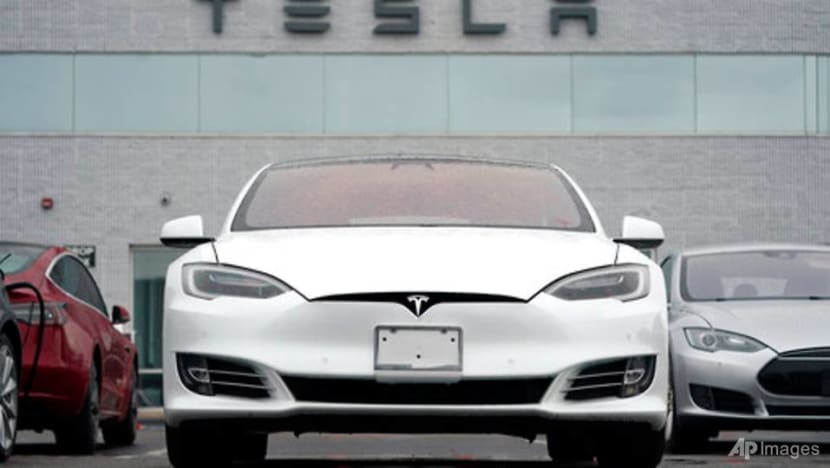Commentary: Driving an electric vehicle doesn't make you morally superior
You already have the means to drive a car, so there’s little praiseworthy about switching, says a philosophy academic.

File photo of a Tesla electric car (Photo: AP)
TORONTO: One of my family members has a vanity license plate that reads “4THEFUTR.” It adorns their electric vehicle —and might strike some as excessively boastful.
Applauding our own actions can be perfectly fine, but is there anything morally praiseworthy about driving an electric vehicle (EV)?
Many would say yes, others aren’t so sure since driving EVs might be environmentally neutral or even harmful when both manufacturing and production are considered — but we should leave those details to the relevant experts.
I’ll assume that driving EVs is generally good for the environment, but that assumption doesn’t show that driving EVs is morally praiseworthy.
MORAL CATEGORIES
Normally, an action is morally praiseworthy when it’s morally good. Philosophers think good actions come in two types. Some actions are morally required, like providing your children with care, or not harming people for fun.
Performing required actions merits praise, at least technically (in practice it is often strange to do so).
Another type of morally good action is one that’s morally permissible. These are actions that we may or can do but don’t have to. We needn’t exchange pleasantries with an elderly neighbour, but if it brightens their day it can be morally good — making people feel good in this way is permissible and often praiseworthy.
An important subset of permissible actions are those with a peculiar status, the supererogatory — these are actions that go above and beyond what’s morally required. They are also different from morally permissible actions, because what’s supererogatory often comes with a cost for the person doing it.
Saying “good morning” to our neighbour doesn’t go above and beyond, but making sure to check up on them and help with errands might.
WHY PRAISE DRIVING AN EV?
With that basic framework in mind, in what way could driving an EV be morally praiseworthy?
If an action is morally required, then we ought to do it. And when we ought to do something, many of us think it needs to be the case that we can do it. Plausibly, you can’t be required to do something you’re genuinely unable to do.
This is a principle that moral philosophers call “ought implies can.” Whether we should accept this principle is contentious, but a common framing is that if someone ought to perform an action, then they must have the opportunity and means to do so.
Thinking that driving an EV is morally required is an awkward fit. For one, EVs are expensive.
Count yourself incredibly fortunate if you’re entertaining buying a US$40,000 car. Subsidies are supposed to bring EVs into reach, but they really operate as benefits for those who already have significant material means, rather than as social policies making those worse off, better off.
When people think driving an EV is morally required, they may be assuming that others share situations much like their own: People with significant financial means, who have standalone or private homes, who commute primarily via their own vehicle, etc.
That shows some important material qualifications to the supposed requirement: If you drive, if you can afford an EV and if you have the space to accommodate it, then you are morally required to drive one.
In that case, driving an EV isn’t a requirement most people have. And whether anyone should do so depends on what other options are available.
Listen to how electrifying vehicles will happen – with a good range of affordable models of different sizes, enough charging stations and safe, fast-charging batteries:
Even if it’s not morally required, similar concerns complicate the idea that driving an EV is morally permissible. Again, the permissibility piggybacks on one’s material means — being able to afford expensive vehicles or owning a home for example.
Choosing to drive EVs looks more like a signal of one’s wealth and privilege, rather than something that warrants moral praise. But those aspects might make it more appropriate to say that driving an EV is supererogatory.
OUR OTHER OPTIONS
The above framing for the supererogatory choice is limited. There is an easily overlooked option, which also happens to be morally praiseworthy: Driving less, or in some cases not at all.
Sometimes the moral thing to do is to change our habits. Being able to drive, yet choosing not to, or choosing public transportation can really be praiseworthy. And there is a general lesson here that goes beyond EVs: What we’re contrasting our choices against is relevant for moral praise.
EVs are popular in part because they leave much of the status quo intact. When you’re well off, switching to an EV requires little of you. Overlooked here is that sometimes what is praiseworthy is when you decide to go without.
When compared to the option to drive less or not at all, it is hard to see driving an EV as something praiseworthy.
There are many moral decisions that make our lives less convenient. Sometimes we should do them anyway, for the future.
Matthew Scarfone is a Postdoctoral Fellow, Philosophy, at the University of Toronto. This commentary first appeared in The Conversation.















